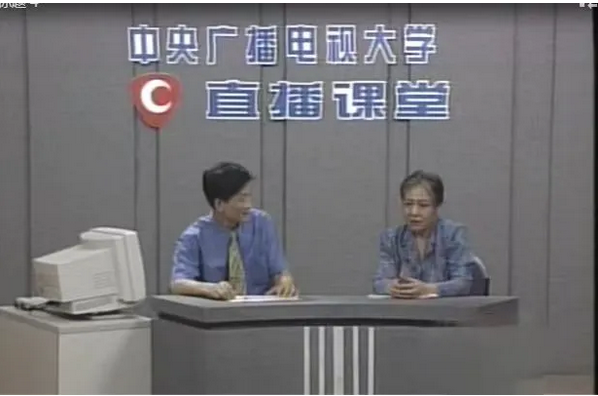 The 1980s and 1990s were a pivotal period for China as it transitioned from a planned economy to a market economy.
The 1980s and 1990s were a pivotal period for China as it transitioned from a planned economy to a market economy.
During this time, the China Central Radio and TV University (CCRTVU) pioneered open education, operating at multiple levels and via diverse pathways. The university focused on moving from a semi-closed to an open school-running mode, integrating high-quality educational resources from society, adapting to the development of modern information technology, and promoting the ongoing modernisation of education.
In 1989, China (Beijing) Education Centre for the Elderly was founded.
On 30 January 1989, the China (Beijing) Education Centre for the Elderly was established at the Great Hall of the People in Beijing. This social education institution for older adults was jointly founded by the CCRTVU, the China Seniors Newspaper, and the Bureau of Retired Cadres of the State Education Commission.
In 1990, China Liaoyuan Radio and TV School was founded.
In April 1990, the China Liaoyuan Radio and TV School was established to offer television teaching courses for a wide range of audiences, including rural and agricultural technicians, young people returning to their hometowns, township Party and government officials, and employees of township enterprises.

Opening Ceremony of China Liaoyuan Radio and TV School
In 1992, Jiang Zemin conducted an inspection visit to the CCRTVU’s textbook sales department.
On 15 May 1992, Jiang Zemin and other leaders conducted an inspection visit to the CCRTVU's textbook sales department.

Jiang Zemin conducted an inspection visit to the CCRTVU’s textbook sales department.
In 1993, Li Tieying inscribed a message of encouragement for the CCRTVU.
On 2 February 1993, Li Tieying, then state councillor and director of the State Education Commission, inscribed a message of encouragement to commemorate the 15th anniversary of Comrade Deng Xiaoping’s approval for the establishment of the Radio and TV Universities. His message read, "Run Well Radio and TV Universities and Bring Education to Tens of Thousands of Households."

Li Tieying inscribed a message of encouragement for the CCRTVU.
In 1994, the Radio and TV Education Building was inaugurated.
In 1994, the Radio and TV education building of State Education Commission was inaugurated.

Radio and TV Education Building
In 1994, Li Lanqing conducted an inspection visit to the CCRTVU.
On 24 November 1994, Vice Premier Li Lanqing conducted an inspection visit to the CCRTVU in the company of deputy directors of the State Education Commission Zhu Kaixuan and Wei Yu.

Li Lanqing conducted an inspection visit to the CCRTVU in the company of deputy directors of the State Education Commission Zhu Kaixuan and Wei Yu.
In 1995, the "Registered RTVU Students" education pilot programme was launched.
In August 1995, the State Education Commission issued the "Notice on the Pilot Work of the Radio and TV Universities (RTVUs) in Enrolling 'Registered RTVU Students' at the Junior College Level" along with implementation opinions. This document outlines specific guidelines for training objectives, enrolment, student registration management, teaching management, examinations, certificate issuance, and pilot units.
In 1996, the "Junior College to Undergraduate" education pilot programme was launched.
In March and July 1996, the State Education Commission issued the "Notice on RTVUs Launching the Pilot Programme of 'Junior College to Undergraduate' Education" and documents outlining the implementation opinions. This specified that eight RTVUs in Beijing, Tianjin, Shanghai, Jiangsu, Yunnan, and Xinjiang were to carry out the pilot programme.

"Notice on RTVUs Launching the Pilot Programme of 'Junior College to Undergraduate' Education"
In 1996, the National RTVU Education Working Conference was held.
In April 1996, to implement the spirit of the "Opinions on RTVUs in Implementing the 'Outline of China's Educational Reform and Development'," which was approved and transmitted by the State Education Commission, the national conference on RTVU education was convened in Huangshan. The conference outlined the ideas, directions, and main tasks for the development of RTVUs for the coming period and established the implementation of the "122 Project."

National RTVU Education Working Conference
In 1996, opinions on the RTVU system construction were released, putting forward the principle of "five unifications."
On 4 October 1996, the Office of RTVU Teaching of the State Education Commission issued the "Opinions on Strengthening the Construction of the RTVU System" along with other documents. These documents proposed the need to enhance system awareness and improve the management system; to develop the construction of the network system and promote the exchange of system information; to adhere to the principle of the 'five unifications' - unified teaching plan, unified curriculum standards, unified teaching materials, unified examinations, and unified grading standards in teaching and learning to improve the quality assurance system; and to strengthen educational and teaching evaluations, while also accelerating the development of regulations.
In 1998, "Several Opinions on the Current RTVU Computer Network Construction" was issued.
On 17 June 1998, the document "Several Opinions on the Current RTVU Computer Network Construction " was issued. This led to the development and construction of the network teaching management platform, network classrooms, campus networks, and other software and hardware environments.

CCRTVU Network Classroom
In 1998, the live class was launched.
In 1998, the live class was launched. Wei Yu, then vice minister of Ministry of Education and president of CCRTVU, delivered an academic report titled "Modern Distance Education".

CCRTVU Live Class
In 1998, the document of "Implementation Opinions on Paper-Free Exams" was issued.
On 18 November 1998, "Implementation Opinions on RTVUs in Launching the Paper-Free Exams" (Dianxiaokao [1998] No.15) was issued. The RTVUs nationwide started to carry out the paper-free exam pilot for the Computer Application Basics course.